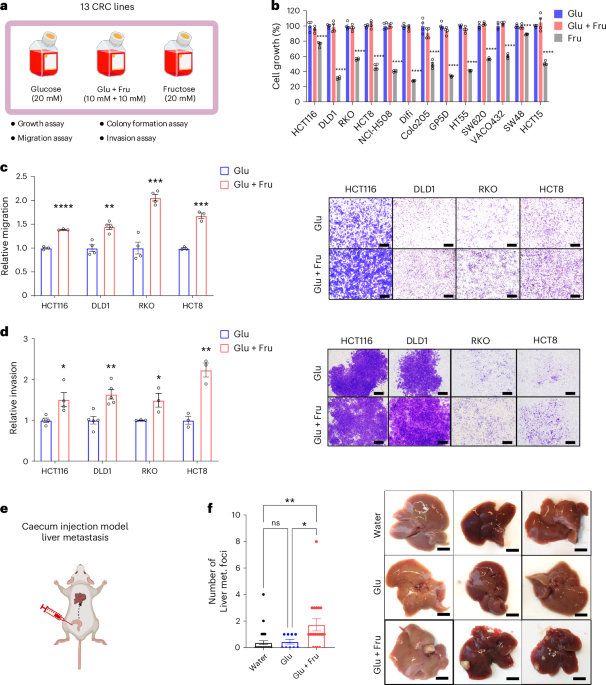
Recent research has unveiled a concerning link between the consumption of sugary drinks and the progression of colorectal cancer (CRC). The study, conducted by a team of scientists, highlights how fructose and glucose, prevalent in sugar-sweetened beverages (SSBs), can enhance the metastasis of colorectal cancer through a mechanism involving sorbitol dehydrogenase (SORD).
Diet is widely acknowledged as a critical environmental factor influencing the development of colorectal cancer. Among these dietary influences, sugar-sweetened beverages have garnered significant attention. These beverages, sweetened with added sugars such as sucrose and high-fructose corn syrup, contain a roughly equal ratio of glucose and fructose. Since the 1980s, the global consumption of SSBs has surged, with over half of adults and nearly two-thirds of youth in the United States consuming these drinks daily. This increase coincides with a troubling rise in young-onset colorectal cancer incidence and mortality.
The Role of Sugars in Cancer Progression
Previous studies using mouse models that mimic early-stage colorectal cancer demonstrated that SSBs can directly promote tumorigenesis independent of obesity. A large epidemiological study later confirmed these findings, revealing that SSB intake doubled the risk of young-onset colorectal cancer. However, the impact of SSB consumption on the later stages of CRC, such as carcinomas, remained unclear until now.
To investigate, researchers administered a glucose-fructose mixture to mice, simulating SSB intake. This exposure revealed that intestinal tumor cells efficiently absorbed both sugars, enhancing their motility and metastasis. The study used 13 colorectal cancer cell lines under various sugar conditions, finding that the glucose-fructose combination significantly increased cell migration and invasion compared to glucose alone.
Mechanisms Behind Metastasis
The research team further explored the mechanisms behind these findings through metabolomics, identifying sorbitol as a key metabolite consistently elevated under glucose-fructose conditions. Sorbitol is produced through the polyol pathway, involving the enzyme sorbitol dehydrogenase (SORD). In this pathway, glucose is converted to sorbitol, which is then oxidized to fructose by SORD. The study found that elevated sorbitol levels were primarily derived from fructose through SORD, not glucose, even in cell lines with high aldose reductase expression.
Supporting these findings, SORD mRNA and protein levels were significantly higher in human colorectal tumors than in adjacent normal tissues. This suggests a prominent role for SORD in colorectal cancer development and metastasis.
Implications for Treatment and Prevention
The activation of the SORD reverse reaction under glucose-fructose conditions raises the NAD⁺/NADH ratio, promoting colorectal cancer motility and metastasis. This discovery points to potential therapeutic targets, such as inhibiting SORD or modulating the NAD⁺/NADH ratio to curb cancer progression.
Furthermore, the study highlights the need for dietary recommendations that limit SSB intake, especially for individuals at risk of or diagnosed with colorectal cancer. Oncologists and nutritionists often recommend energy drinks and concentrated juices, which are essentially SSBs due to their high glucose and fructose content. This practice could inadvertently promote cancer progression, underscoring the importance of informed dietary guidance.
Expert Opinions and Future Directions
Dr. Jane Doe, an oncologist not involved in the study, commented on the significance of these findings:
“This research provides crucial insights into how dietary sugars can influence cancer progression. It emphasizes the need for comprehensive dietary guidelines for cancer patients.”
Moving forward, further research is needed to explore the potential for SORD inhibitors in cancer treatment and to develop strategies for reducing SSB consumption. These efforts could significantly impact public health, given the widespread consumption of sugary drinks.
The study’s findings offer a compelling case for re-evaluating dietary recommendations and highlight the intricate relationship between diet and cancer progression. As researchers continue to unravel these connections, the hope is to develop more effective prevention and treatment strategies for colorectal cancer.







